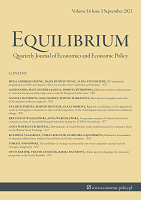Does income inequality matter for CO2 emissions in Russian regions?
Does income inequality matter for CO2 emissions in Russian regions?
Author(s): Natalia Borisovna Davidson, Oleg Svyatoslavovich Mariev, Sophia TurkanovaSubject(s): Energy and Environmental Studies, Regional Geography, Economic development, Socio-Economic Research
Published by: Instytut Badań Gospodarczych
Keywords: climate change; CO2 emissions; income inequality; economic development; environmental Kuznets curve;
Summary/Abstract: Research background: Intensive economic growth in Russian regions during recent decades has been associated with numerous environmental issues, particularly increasing CO2 emissions, as well as income inequality. To achieve sustainable development, it is necessary to resolve these issues. Purpose of the article: To shed light on the impact of income inequality on CO2 emissions based on Russian regional data covering the years 2004?2018. Methods: Gini index and decile dispersion ratio are used to measure income inequality. To study the impact of income inequality on CO2 emissions in the Russian regions, we estimate econometric models with fixed and random effects and apply GMM method. We test the hypothesis of the environmental Kuznets curve to determine the impact of economic growth on CO2 emissions. Findings & value added: The results show that CO2 emissions increase in tandem with growth in income inequality between 10% of people with the lowest income and 10% of people with the highest income. Simultaneously, CO2 emissions decrease with growth of Gini coefficient. The hypothesis of the Environmental Kuznets Curve was confirmed based on GMM method. Our findings underscore that the activities of the extraction and manufacturing sectors, as well as energy consumption, increase CO2 emissions. The chief significance of this paper is the finding that large income gap between extremely rich and extremely poor population cohorts increases CO2 emissions. This implies that economic policy aimed at reducing income inequality in Russian regions will also reduce CO2 emissions, especially if accompanied by increased use of environmentally friendly technologies. From the international perspective, our research can be extended to study other countries and regions.
Journal: Equilibrium. Quarterly Journal of Economics and Economic Policy
- Issue Year: 16/2021
- Issue No: 3
- Page Range: 533-551
- Page Count: 19
- Language: English

